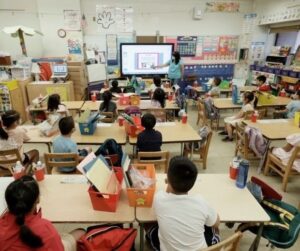What is causing the teacher shortage across the nation? Now that the COVID pandemic has ended and in-school teaching has resumed, things should be getting back to normal, right? Well, they aren’t. In 2022, the Education Department revealed in a press release that 44% of schools nationwide reported teacher vacancies. While much of this can be blamed on the rise of homeschooling after schools shut down, there’s a much bigger picture that involves school violence and politics.
The Real Causes of the Teacher Shortage
Between February 2020 and May 2022, 300,000 teachers quit, and others said they wanted to do the same, according to The Wall Street Journal. “There was a 37-year-high in Washington teachers leaving the profession last year,” MYNorthwest reported. “1.6% more teachers chose to switch careers in 2022 compared to 2021. Across the state, that is equivalent to the loss of about 1,000 teachers.” A report in May by the US Bureau of Labor Statistics showed that “[n]early half of the public education employees – working in elementary, secondary and postsecondary institutions – who left the profession in March resigned.”
The pandemic and shuttering schools takes a chunk of the teacher shortage blame. Sarah Taylor, a teacher for Seattle Public Schools, told MYNorthwest:
“We see students, now, who have lost all of that time, and we’re seeing a lot of behaviors and social-emotional loss … In most classrooms, there isn’t that time built into curriculums to deal with students who are being the class clown, who are having a meltdown.”
Liv Finne, director of the Washington Policy Center’s Center for Education, claimed going back to in-person learning was a big shock for students, especially those who hadn’t spent a lot of time in a classroom before being forced into a homeschooling atmosphere. “They lost the sort of rigor about going to school, sitting there, working. There’s a huge discipline involved, and then that’s taken away, and then when you say, ‘Now kids, magically it’s back on you,’ you’re going to have trouble,” she told MYNorthwest.
Added to that burden, educators complain there just aren’t enough resources and that the too-high children-to-teacher ratios make it impossible to keep up with the demands. Finne further explained: “Teachers have to make up that work somehow, yet they have to cover the current curriculum as well, so no wonder that teachers are pulling their hair out. They’re asked to do an impossible job.”
So, what does this mean for the students who have missed out on in-classroom learning and are now dealing with the teacher shortage and lack of resources? “Students are acting below grade level,” Taylor said. “We’re having to put in a lot of extra time to support them in ways that we’re not used to.”
Hiring, Qualifications, and Pay

(Photo by Michael Loccisano/Getty Images)
Some educators are leaving the profession because they aren’t getting enough pay or respect. An EdWeek/Merrimack College survey found that 45% “of teachers say they did not feel respected or seen as professionals by the general public.” As Melissa Parrish, a first-grade teacher in Los Angeles, CA, told CNN, “In America, respect for your job is equivalent to pay. So the lack of pay is like a lack of respect for the work that people are doing.”
There is such a teacher shortage that some school districts have opted to bring in substitutes and others who don’t have the required qualifications. Even though there are a lot of job openings in public education, there just aren’t enough qualified teachers left willing to take them. Less students are majoring in the profession as well, so there won’t be as many newly graduating educators to draw from in the future, either.
Mandy Davis was a private school principal who homeschooled her children. She told Fox News’ Pete Hegseth that the educational system had “deep-rooted issues” that are only exasperated by teachers quitting. “What’s concerning as a parent is wondering who is going to come into those roles. We’re already seeing dozens of states moving towards changing certifications and license required to try to grow this pool of teachers,” she said.
Politics and Race
A recent survey by the EdWeek Research Center and Merrimack College found that-one in-three teachers said they would likely quit in the next two years. School violence and politics also contribute to the continued teacher shortage. Instructors have claimed they feel unsafe and unprotected on the job due to school shootings.
Another complaint is that there are not enough black educators. Becky Pringle, president of the National Education Association, the largest teachers union in the country, told CNN: “At the moment, when we need more [teachers of color], we have less of them. And our teachers of color, particularly Black teachers… they disproportionately are leaving. We get them in, and they leave really quickly because of pay.” The National Center for Education Statistics data for the 2020-21 school year recorded only 20% of public elementary and secondary school teachers were people of color, the outlet explained.
Political disorder is causing havoc in the educational system and is contributing to the teacher shortage, as well. Conservatives and liberals complain they are not allowed to educate their students effectively. Conservatives argue that critical race theory (CRT) makes children uncomfortable because it teaches blame and shame and that one race is “evil.” They also argue that sex education and LGBTQ concerns should not be taught to young children.

(Photo by Paul Bersebach/MediaNews Group/Orange County Register via Getty Images)
Liberals contend that there is not enough inclusion and diversity within the system and more needs to be done, including teaching CRT and educating students more thoroughly about the LGBTQ and transgender communities.
Teachers have been fired or put on administrative leave for using a curriculum that goes against their particular school’s beliefs. For example, James Whitfield became the first black principal at Colleyville Heritage High School in the Dallas-Fort Worth suburb in Texas just before the death of George Floyd. When he started talking about systemic racism, he was applauded at first, but later he was put on administrative leave for voicing his opinion.
Bret Weinstein was a professor of biology at Evergreen State College in Washington. When the students called for a “Day of Absence” where no white people would be allowed on campus, he spoke out against it. He’d been advised to stay away for his own safety, so he and his wife sued the school. The institution settled with the condition that Weinstein resigned his position.
Some teachers complain that politics has ruined it for students to be able to debate ideas without fear of retaliation. Challenging thoughts and ideals is important for children (and adults) to learn how to communicate effectively, but the concern that any word or thought could be considered racist or inappropriate has hindered the freedom of speech and collaboration educators employed in their classrooms.
All opinions expressed are those of the author and do not necessarily represent those of Liberty Nation.
Do you have an opinion about this article? We’d love to hear it! If you send your comments to [email protected], we might even publish your edited remarks in our new feature, LN Readers Speak Out. Remember to include the title of the article along with your name, city, and state.
Please respect our republishing guidelines. Republication permission does not equal site endorsement. Click here

